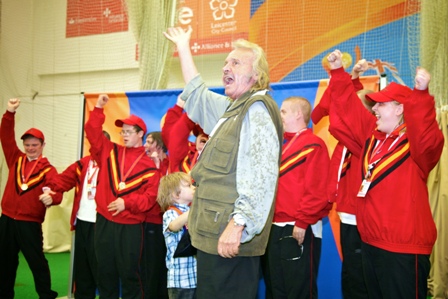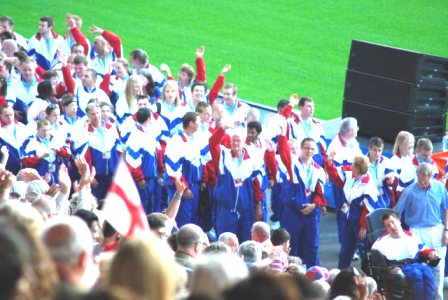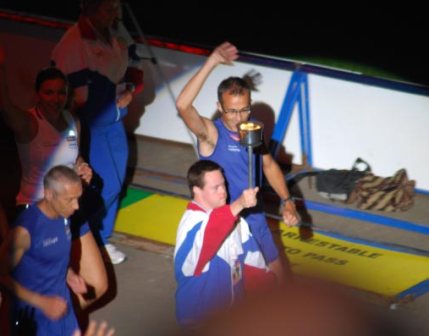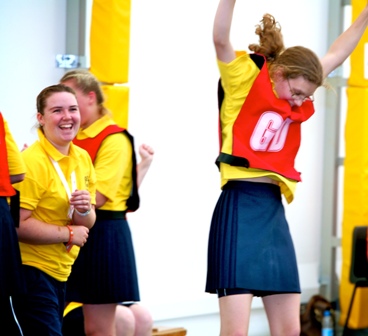
Sharing the joy of the Special Olympics
Ever heard of the Special Olympics?
Having played a part in Leicester's latest sporting success, Martyn Allison offers a very personal reflection on what sport equity is really all about.

Sharing the joy of the Special Olympics
I arrived as deputy director of recreation at Leicester City Council in 1990. A year earlier they had hosted the Special Olympics in the city and the department was still buzzing. Everyone wanted to tell me about it and what I had missed. A few years later I was lucky enough to oversee the city hosting the European football cup for people with learning difficulties and soon after the first ever world cup. I soon realised why people were buzzing and these events left a lasting impression on me.
When I heard Leicester had been awarded the hosting of the Special Olympics for a second time, the first city to do so, the hairs on the back of my neck immediately bristled. I offered to help and became part of the team capturing the legacy and impact of the games.
During games week and I tried to see as much of the spectacle as I could, starting with the opening ceremony on Saturday night. A total of 2,700 athletes from England, Scotland and Wales, their families and the public filled the Walkers Stadium. The sheer jubilation and expectation could be seen and felt. Local sport personalities from across the city and county were leading out the 19 regional teams and Martin Johnson, a Leicester favourite, opened the games. The event was even graced by the attendance of the Prime Minister and his family on the way to their holiday, much to the joy of the many athletes he met.
On Tuesday I went to see the basketball and athletics with hundreds of sportsmen and women competing to win but in a way that reflects the real power of these games. The oath of the games is “Let me win, but if I cannot win, let me be brave in the attempt” and this captures the essence of the event. You have no choice but to see the ability not the disability; you are in awe at what these individuals and teams achieve.
Wednesday I went with a friend to see the power lifting. Again the atmosphere was electric but what struck us both was the sheer quality of the sport. This was high-quality competition at its best; the desire to win was as strong as any other sporting event. However, it is when the medals are presented that the difference shines through because everyone is a winner. The medal rostrum is set out from one to eight and everyone gets a medal, including the usual gold, silver and bronze for the winners. The expression on the athletes’ faces says it all and you cannot help but be inspired by them.
On Thursday I returned to the basketball and the athletics after visiting the football, this time with another friend and former work colleague. John was once a professional footballer and the driving force behind my Action Sport team in Coventry. Again it was not long before he was overcome by the power of what he was seeing and wishing he was twenty years younger. At the athletics he asked to see the medals a young girl had won and she was overwhelmed with pride to show them and tell him what she had achieved before disappearing back to the track to come last in her next event.
Friday it was badminton and my turn to present the medals. As an ex-badminton player, I was struck by the quality of the action with at least some of the players more than capable of competing on equal terms in the local county leagues I once played in. I presented medals to the men’s doubles where again every player was recognised for their achievement and the gold is the most treasured of possessions. Leaving with the games executive director, I was humbled and inspired but sad the games were finally at an end.
From what I remember from my time with the football, organising these games must have been a headache and the team at Leicester should be proud of what they have delivered. What the games have done for the city is immense. The two universities provided the halls for the athletes, the local primary care trust the health support. Voluntary Action Leicester brought together and trained thousands of volunteers from across all the different communities of Leicester. Local business and charities sponsored events and equipment. The football club hosted the games village and the opening event, while the local press and media provided coverage in the run up and on a daily basis. The event has brought the city together around a common cause and the city was proud to do so with the council at the heart of the whole thing, showing real community leadership.
However, this is where I start to express my disappointment. The council is likely to be left with a significant funding deficit because the downturn in the economy came at just the wrong time. Some organisations that should have been part of this project were not or came on board very late. My personal attempts to raise £80,000 for the legacy impact study also fell on deaf ears.
Then there is the national media coverage; so far I have not seen much. Local papers, television and radio have done the event proud, covering the event daily. Nationally my search has found that the BBC website carries the opening event, as does the Number 10 website, and the Guardian did an interview with Tim Shriver, chairman of the Special Olympics, in the run up to the games. However, I have listened to BBC Five Live daily as I have driven round the city, watched the national news and, while every other major sporting event and some minor ones have been reported, no mention yet of the Special Olympics. I have searched the internet for articles from national papers and none have appeared. I am told when Gary Lineker was interviewed by the press their first question was to seek his views on the latest player movements in the Premiership. How sad is that? Has anyone seen this Olympic sport covered on our back pages in a way it would have been for the main Olympics and even the Paralympics? I do hope I am proved wrong but I am not holding my breath. National media, please think about the opportunity you have missed and why you treat non-elite sport in this way.
Our major policy objectives are currently participation, equity, community cohesion, and, of course, creating an Olympic legacy. In the run up to the Special Olympics we were visited by a number of ministers, including Gerry Sutcliff and Phil Hope, and sport personalities like Steve Redgrave, all emphasising the importance of the games. Although Sport England made a significant financial contribution to the games and some governing bodies were supporting athletes and officials, the real potential of using the power of this event to promote these policy goals, to show people what sport can do and to demonstrate real sport equity appears in my opinion to have been missed. National leaders of sport take note and make sure next time you are more actively engaged in this initiative.
When we have completed the impact and legacy research I hope we can use it to engage the sector in the Special Olympics and show them what the event can do for them. In the meantime if you have not heard of the Special Olympics here is your chance: go to the Leicester website at http://www.sol2009.com/. Find out what’s going on in your community and go out and help them with facilities, events and resources. If you think you are up for it then consider hosting the games in the future. It will change your life and the lives of many others around you.
Martyn Allison is national advisor for culture and sport with the IDeA.
For further details of the 2009 Special Olympics visit www.sol2009.com
The Leisure Review, September 2009
© Copyright of all material on this site is retained by The Leisure Review or the individual contributors where stated. Contact The Leisure Review for details.

Proud to be part of one of Leicester's major events

The torch arrives for the Games

Changing lives by taking part